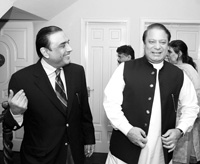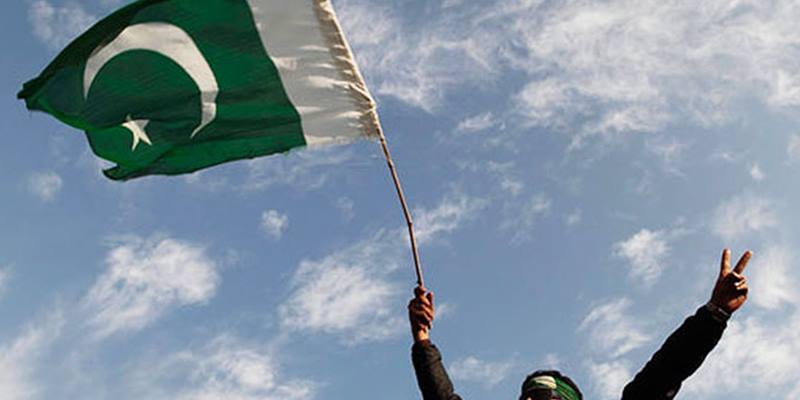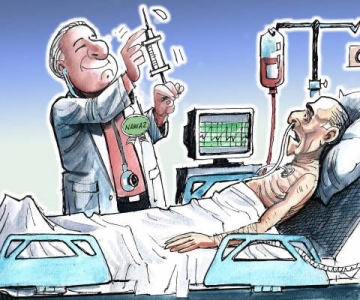It is still not too late that PML-N and PPP and the regional parties sit together and agree on the way forward says Raza Rumi
Many decades ago, our Governor General Iskander Mirza had rather contemptuously stated that democracy does not suit the genius of Pakistani people. Immediately after these words of wisdom were uttered, direct military rule not only exiled Mirza but also became a norm rather than aberration. For the last six decades or so we have not been able to overcome this political reality. The unelected institutions of the state are not willing to give up the power they inherited from the might of the colonial state. At best, they are willing to share power to a degree that they deem fit.
It is now clear that within a few months Pakistan is due for another political upheaval. Barely two years after an election took place, the political elites are back in business: bickering, wrangling and oblivious to their historical role in strengthening the fragile democratic process. The unelected institutions have traditionally been contemptuous of democracy and their conduct in the last two years has not been surprising. The losers at the hand of the military rule – the PML-N and the PPP ought to have learnt their lesson: no matter how adverse the political climate was, the political forces had to stay united for a common cause.
years after an election took place, the political elites are back in business: bickering, wrangling and oblivious to their historical role in strengthening the fragile democratic process. The unelected institutions have traditionally been contemptuous of democracy and their conduct in the last two years has not been surprising. The losers at the hand of the military rule – the PML-N and the PPP ought to have learnt their lesson: no matter how adverse the political climate was, the political forces had to stay united for a common cause.
However, the brief interlude of political cooperation led to mistrust and misgivings among the political players. First the restoration of judges and a partisan interpretation to the issue of independence of the judiciary created a rift between the two parties. Second, the imposition of ill-advised Governor’s rule led to widening of the gulf. This was followed by the long march that led to the restoration of the deposed judges. In the process, the co-chairperson of the PPP was termed as a leader who did not keep his promises and time and again betrayed the trust of Mian Nawaz Sharif painted by a prejudiced media as an innocent victim.
These differences had become so intractable that the Kerry Lugar bill controversy led by sections of the media brought the two parties against each other. The secret meetings of top leaders of PML-N and the Army were reported in the press leading to a mild condemnation by Mian Nawaz Sharif who obviously knew that this was a replay of the 1990s. And now when the Supreme Court has struck down the National Reconciliation Ordinance and the fall of Mr Zardari seems imminent, the antagonism between the parties is at an all-time high thus giving credence to the fact that non-political players are adept at dividing the political class.
The situation today is quite peculiar. The three provincial assemblies have passed unanimous resolutions in favour of the President while the Punjab Assembly with a PML-N majority has ostensibly refused to do so. It is a dangerous signal many counts. Once again, Punjab versus the smaller provinces perception has gained currency and through these fissures the future of the democratic system seems unclear. The country is abuzz with rumours that a ‘wrapping up’ of the system is on the cards or the real power wielders in Rawalpindi are contemplating the ‘Bangladesh model’. President Zardari is crying hoarse that enemies of democracy are out to get him. The media’s hostility to the elected governments and overplay of the cliché of lack of governance in the country is further deepening the crisis.
Such systemic shocks to a nascent democratic process are harmful for the society and endanger our cohesion as a fractured and factionalised society. We have already witnessed the long-term consequences of non-democratic governance. The first and second martial laws broke the country into two halves. The Zia regime destroyed Pakistan as a society and created the drugs-Kalashnikov culture and nurtured militancy as a state policy that we are trying to undo with much bloodletting. Everyone knows how Musharraf’s regime ended and the way it led to the alienation of Balochsitan, the insurgencies in the northwest and the tribal areas and the colossal economic meltdown due to unrepresentative policies.
In spite of these clear lessons, the wizards of our political scene are quite content with the prospect of another intervention by the khakis. The irony is that Abdul Hafeez Pirzada who boasts himself as the architect of the 1973 Constitution is not shy of stating that the Supreme Court shall invite the Army to implement its judgments. One wonders how Mian Nawaz Sharif is silent in view of this considering that he and his party suffered at the hands of General Musharraf. There are eminent writers in the press who quote or refer to what the military establishment is thinking or has decided to do. They write with authority but their views are never contradicted by the ISPR. How can journalists and lawyers have access to what the military is thinking and if someone is speculating or tarnishing the image of the armed forces then this becomes a serious matter. At least on the record, the current Army leadership has supported the transition to military rule.
It is still not too late that PML-N and PPP and the regional parties sit together and decide on the way forward. The issue is not about saving an individual in office. But if a President has been elected by the electoral college with a majority through a constitutional process then this becomes an issue of the legitimacy of the institutions. Political parties have to become the guardians of representative institutions and not work towards undermining them.
The naïve argument being advanced these days holds that if the President is declared ineligible by the Court or is pressurised to resign, there is no threat to the system. Well, the simple truth is that technical knock-outs have been all too common in our history. Military rulers since 1950s have held purges of politicians and corruption has been the most common of pretexts to oust elected representatives. Tomorrow if another elected ruler is thrown out of the office on technical grounds, this would belittle the essence of democracy and the spirit of our Constitution whereby sovereignty has been delegated to elected representatives.
It should, therefore, be understood that if Constitutional means are not used to oust the President then the system will soon head towards a collapse. It may not happen immediately but the instability arising out of the current mess will lead to another crash where a direct or indirect military rule will become a reality, once again. One is sure that our political parties do not want that. But they will have to make an effort to recue the system and not be bystanders to the current scenario.
There is no other way Pakistan can be governed. We have had Chief Martial Law Administrators, Field Marshals, and Chief Executives and they all have not delivered on their trumpeted promises of eliminating corruption or strengthening national interest. Instead, we have become a weaker and vulnerable society. Pakistan is a federation and it has to be ruled through a political system that provides space for all — the excluded, marginalised and its myriad ethnic nationalities.
Why is it the case that the Presidency is always reserved for Iskander Mirzas, Ghulam Ishaq Khans, and the khakis? This will have to change and the biggest problem with the incumbent is that he is not a politico nurtured by the establishment. All the arguments against democracy that its prerequisites are missing in Pakistan become illogical when one looks at our bigger neighbour where the gradualism of democracy has led to social and political transformations. India’s marginalised sections such as the Dalits are now in the mainstream politics and the democratic system gives a voice to the diverse communities within the country.
If the political elites want to save the system and their present and future role in governance they will have to become active participants of the game. Three things would need to be done immediately. First, an agreement on the constitutional amendments that have been delayed; second, recourse to the charter of democracy whereby they will agree that unelected institutions will not be allowed to derail the democratic system and finally a clear cut strategy to save the current democratic system at all costs above the party lines. It is a tall order given the shortsightedness and feudal character of our political class but they will have to make a beginning somewhere. Otherwise, we should bid farewell to democracy and accept that Iskander Mirza was right: we are not fit for a democracy.
The writer is a development professional based in Lahore. He blogs at www.razarumi.com and edits Pak Tea House and Lahorenama e-zines



